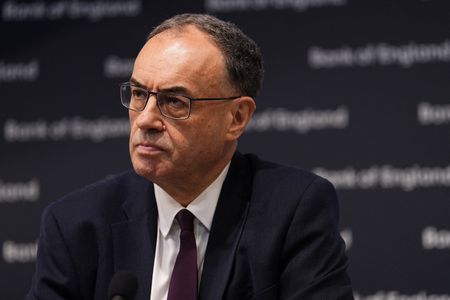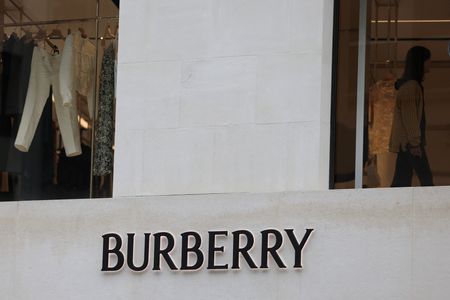By David Milliken
LONDON (Reuters) -Bank of England Governor Andrew Bailey said markets had understood his message that BoE interest rates would continue to move “downwards gradually over time” but that there was now less certainty about the speed of cuts.
“There is now considerably more doubt about exactly when and how quickly we can make those further steps,” Bailey told a hearing of the House of Commons’ Treasury Committee, echoing the message he gave at a press conference after August’s rate cut.
“That’s the message I wanted to get across. Now, I think actually, judging by what’s happened, certainly to market pricing since then, I think that message has been understood.”
Bailey also said he was “very concerned” about political pressure being put on the U.S. Federal Reserve.
Last month the Monetary Policy Committee voted by the narrowest of margins – 5 to 4 – to cut Bank Rate to 4% from 4.25% after an unprecedented two rounds of voting, its fifth quarter-point rate cut since starting to reduce borrowing costs in August 2024.
Financial markets currently see only a one in three chance of another rate cut by the end of the year and do not fully price in a next quarter-point rate cut until April 2026, according to LSEG data.
A Reuters poll of economists last month still showed a median expectation for a further rate cut before the end of this year and another one in the first quarter of 2026.
Since then, inflation has picked up to 3.8% – nearly double its target and the highest in the Group of Seven advanced economies – and the BoE expects it to reach 4% in September and not return to target until the second quarter of 2027.
SPLIT COMMITTEE
Speaking alongside Bailey at the parliamentary hearing were Deputy Governor Clare Lombardelli and external MPC member Megan Greene – who voted against cutting rates last month – and MPC member Alan Taylor who initially voted for a half-point cut before switching to support a quarter-point reduction.
Taylor said his preference would be to see rates cut at a pace of four or five cuts a year as he thought incoming wage deals were in line with inflation returning to its 2% target and did not see warning signs from what he viewed as a modest rise in household inflation expectations.
By contrast, Lombardelli and Greene said they were concerned by the rise in expectations and did not think interest rates were still at a level that placed significant downward pressure on inflation.
“I am not predicting that we are already at neutral, but nor am I confident that if we reduce restrictiveness much further we will still be sufficiently restrictive to return inflation to target sustainably,” Lombardelli said in a written report to the committee at the start of the hearing.
Earlier on Wednesday, British 30-year gilt yields rose to their highest since 1998 at 5.75%.
Bailey said it was “important not to over-focus” on this as the government no longer raised significant finance from debt of this maturity and that he viewed the move as reflecting a global trend rather than UK-specific problems.
(Additional reporting by Sarah Young, William James, Yoruk Bahceli and Sachin Ravikumar; Editing by Hugh Lawson)











